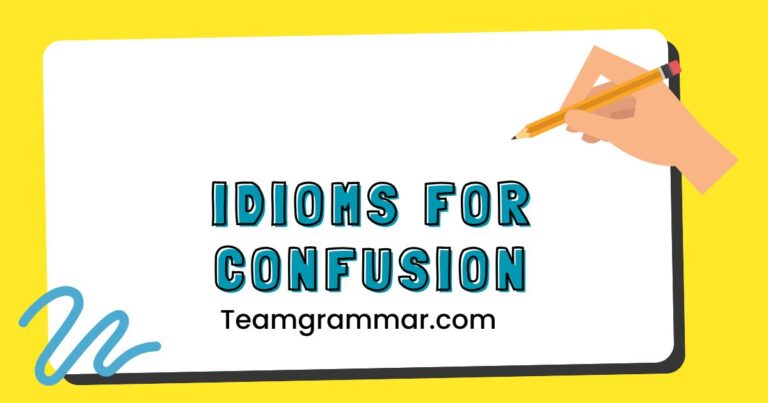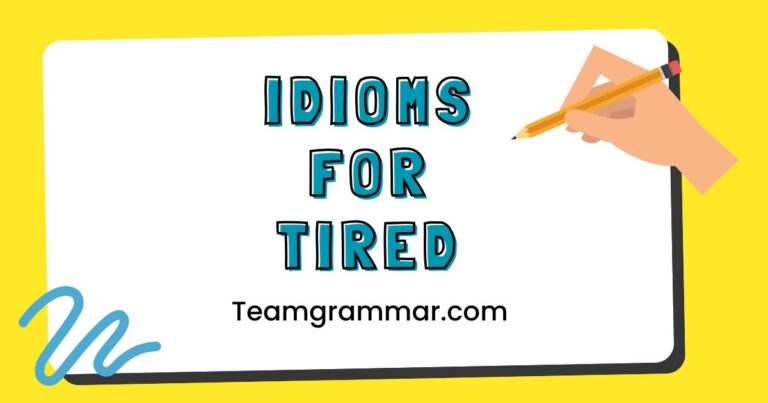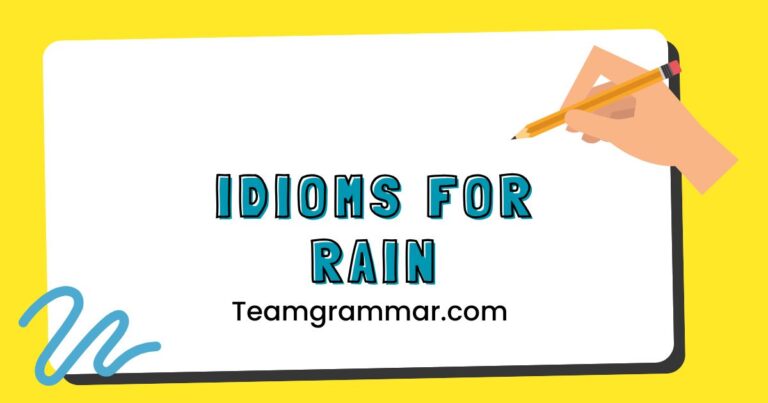31 Idioms for Hard Work: Mastering Effort & Dedication
Understanding idioms related to hard work is crucial for mastering English fluency. These colorful expressions add depth and nuance to your language, allowing you to communicate more effectively and connect with native speakers on a deeper level.
This article provides a comprehensive guide to idioms about hard work, offering definitions, examples, and practical exercises to help you incorporate them into your everyday vocabulary. Whether you are an ESL student, a business professional, or simply an English enthusiast, this guide will equip you with the knowledge and skills to confidently use these idioms.
This guide is designed for English language learners of all levels, from intermediate to advanced. By learning these idioms, you’ll not only enhance your vocabulary but also gain insight into the cultural values and perspectives embedded in the English language.
This knowledge is invaluable for effective communication and understanding in various contexts, from casual conversations to professional settings.
Table of Contents
- Definition of Idioms for Hard Work
- Structural Breakdown of Hard Work Idioms
- Types and Categories of Hard Work Idioms
- Examples of Hard Work Idioms
- Usage Rules for Hard Work Idioms
- Common Mistakes with Hard Work Idioms
- Practice Exercises
- Advanced Topics: Nuances and Context
- FAQ Section
- Conclusion
Definition of Idioms for Hard Work
Idioms are phrases or expressions whose meanings cannot be understood from the literal meanings of the individual words. Instead, they have a figurative meaning that is culturally specific.
Idioms for hard work are phrases that describe effort, dedication, and perseverance in achieving a goal. These idioms often use metaphorical language to convey the intensity and commitment involved in working diligently.
The function of hard work idioms is to add color and expressiveness to language. They allow speakers and writers to convey complex ideas about effort and determination in a concise and memorable way.
Understanding these idioms is essential for comprehending spoken and written English, as well as for communicating effectively in various social and professional contexts.
Hard work idioms can be classified based on several factors, including the type of effort they describe (e.g., physical, mental), the context in which they are used (e.g., business, education), and the specific image or metaphor they employ (e.g., sweating, burning the midnight oil). Recognizing these classifications can help learners better understand and use these idioms appropriately.
Structural Breakdown of Hard Work Idioms
The structure of hard work idioms can vary, but many follow common patterns. Some are simple phrases consisting of a verb and a noun, such as “burn the midnight oil.” Others are more complex, involving prepositional phrases or clauses, such as “go the extra mile.” Understanding these structural elements can help learners recognize and interpret new idioms more easily.
Many hard work idioms involve verbs that describe physical or mental exertion, such assweat,grind,toil, andplow. These verbs are often combined with nouns that represent the object of the effort, such asbrow,stone, andfield.
The combination of these elements creates a vivid image of the hard work being described.
Another common pattern involves the use of metaphorical language to convey the intensity of the effort. For example, the idiom “move mountains” uses the image of overcoming a massive obstacle to represent the significant effort required to achieve a challenging goal.
Similarly, “leave no stone unturned” suggests a thorough and exhaustive search, leaving nothing to chance.
Types and Categories of Hard Work Idioms
General Effort and Dedication
These idioms describe a general commitment to hard work without specifying a particular type of effort or context. They emphasize the importance of diligence and dedication in achieving success.
Overcoming Challenges
These idioms focus on the ability to persevere and overcome obstacles in the face of adversity. They highlight the importance of resilience and determination in achieving goals.
Persistence and Tenacity
These idioms emphasize the importance of sticking with a task or goal despite difficulties or setbacks. They highlight the value of perseverance and determination in achieving long-term success.
Teamwork and Collaboration
These idioms describe the importance of working together with others to achieve a common goal. They highlight the value of cooperation, communication, and shared effort.
Reward and Recognition
These idioms describe the positive outcomes and recognition that result from hard work and dedication. They highlight the importance of valuing effort and rewarding achievement.
Examples of Hard Work Idioms
The following sections provide extensive examples of hard work idioms, organized by category. Each example is accompanied by a definition and a sample sentence to illustrate its usage.
General Effort and Dedication
This table provides examples of idioms that describe general effort and dedication. Each idiom is defined, and a sample sentence is provided to illustrate its usage in context.
| Idiom | Definition | Example Sentence |
|---|---|---|
| Burn the midnight oil | Work late into the night | She had to burn the midnight oil to finish the project on time. |
| Go the extra mile | Do more than what is expected | He always goes the extra mile for his clients. |
| Put your nose to the grindstone | Work very hard and diligently | If you want to succeed, you need to put your nose to the grindstone. |
| Work your fingers to the bone | Work extremely hard, often to the point of exhaustion | She worked her fingers to the bone to provide for her family. |
| Pull your weight | Do your fair share of the work | Everyone needs to pull their weight on this project. |
| Be a workhorse | Someone who works tirelessly | She is a real workhorse in the office, always taking on extra tasks. |
| Slave away | Work very hard with little or no reward | He slaved away at the job for years before getting a promotion. |
| Keep your shoulder to the wheel | Keep working hard and diligently | We need to keep our shoulder to the wheel if we want to meet the deadline. |
| Sweat blood | Work extremely hard and make a big effort | I sweated blood to get this presentation ready. |
| Be up to your ears (in work) | Be very busy with work | I’m up to my ears in work this week. |
| Give it your all | Put all your effort into something | She decided to give it her all in the final exam. |
| Go all out | Make the greatest effort possible | They went all out to make the party a success. |
| Plug away (at something) | Work steadily and continuously at something | He plugged away at his thesis for months. |
| Hammer away (at something) | Work persistently at something | The team hammered away at the problem until they found a solution. |
| Go the whole hog | Do something as completely as possible | They decided to go the whole hog and renovate the entire house. |
| Leave no avenue unexplored | Try every possible course of action | The detectives left no avenue unexplored in their investigation. |
| Leave no stone unturned | Try every possible way to find something or solve a problem | The company left no stone unturned in their search for a new CEO. |
| Pitch in | Join in to help with a task | Everyone pitched in to clean up after the party. |
| Be snowed under | Have too much work to do | I’m completely snowed under with paperwork at the moment. |
| Toil away | Work extremely hard for a long period of time | Farmers often toil away in the fields from dawn till dusk. |
| Put in a good day’s work | Work productively throughout the day | He always puts in a good day’s work and goes home satisfied. |
| Be chained to your desk | Be forced to stay at your desk and work | She felt like she was chained to her desk with all the deadlines looming. |
| Knuckle down | Start working hard, especially when you should have done it earlier | With exams approaching, it’s time to knuckle down and study. |
Overcoming Challenges
This table provides examples of idioms that describe overcoming challenges. These phrases emphasize resilience and determination.
| Idiom | Definition | Example Sentence |
|---|---|---|
| Bite the bullet | Face a difficult or unpleasant situation with courage | I had to bite the bullet and tell him the bad news. |
| Rise to the occasion | Meet a challenge successfully | She rose to the occasion and delivered a fantastic presentation. |
| Keep your head above water | Manage to survive or cope with a difficult situation | It’s hard to keep my head above water with all these bills. |
| Weather the storm | Survive a difficult period | The company managed to weather the storm during the recession. |
| Fight an uphill battle | Face a difficult struggle with little chance of success | They are fighting an uphill battle to save the endangered species. |
| Get through something | Manage to survive a difficult experience | We got through a very difficult time after losing our jobs. |
| Tough it out | Endure a difficult situation with determination | We decided to tough it out and finish the hike despite the rain. |
| Hang in there | Persist and not give up | Hang in there! You’re almost finished with the project. |
| Turn the tide | Reverse a negative trend or situation | The new strategy helped to turn the tide and improve sales. |
| Make headway | Make progress despite difficulties | We are finally making headway on the construction project. |
| Push through | Continue despite difficulties | Despite the setbacks, we need to push through and complete the task. |
| Take the bull by the horns | Confront a difficult situation with courage and determination | He decided to take the bull by the horns and address the problem directly. |
| Swim against the tide | Go against the prevailing opinion or trend | She had to swim against the tide to get her ideas accepted. |
| Cross that bridge when you come to it | Deal with a problem when it arises | Let’s cross that bridge when we come to it; there’s no use worrying about it now. |
| When the going gets tough, the tough get going | When faced with difficulties, strong people take action to overcome them | When the going gets tough, the tough get going; we need to find innovative solutions. |
| Come hell or high water | No matter what difficulties may arise | Come hell or high water, I’m going to finish this marathon. |
| Against all odds | Despite seemingly insurmountable obstacles | They succeeded against all odds in launching their startup. |
| Back against the wall | In a desperate situation with limited options | With their back against the wall, they had to make a difficult decision. |
| Climb the ladder | Progress in a career or organization | She worked hard to climb the ladder and become a manager. |
| Clear the decks | Prepare for action by removing obstacles | We need to clear the decks before we start the new project. |
Persistence and Tenacity
This table offers idioms that highlight persistence and tenacity, emphasizing the importance of sticking to a task.
| Idiom | Definition | Example Sentence |
|---|---|---|
| Stick to your guns | Maintain your position or opinion despite opposition | He decided to stick to his guns and defend his beliefs. |
| Stay the course | Continue on a chosen path despite difficulties | We need to stay the course and continue with our plan. |
| Keep at it | Continue working hard | Keep at it! You’re making good progress. |
| Never say die | Never give up | The team never said die and managed to win the game. |
| Hang tough | Remain determined and resolute | They had to hang tough during the negotiations. |
| Hold out | Persist in a difficult situation | They managed to hold out until help arrived. |
| Press on | Continue forward despite obstacles | We must press on and complete the mission. |
| Plod on | Continue steadily despite difficulties | He plodded on with his research despite the setbacks. |
| Keep plugging away | Continue working persistently | She kept plugging away at her studies. |
| Stay the distance | Continue to the end of a task or competition | He managed to stay the distance and win the race. |
| Persevere | Continue despite difficulties | We must persevere in the face of adversity. |
| Keep the faith | Maintain hope and belief | We need to keep the faith that things will improve. |
| Stand your ground | Defend your position | She decided to stand her ground and challenge the decision. |
| Not let up | Continue with undiminished intensity | He did not let up until he achieved his goal. |
| Hold fast | Maintain a firm grip or position | We need to hold fast to our principles. |
| Forge ahead | Move forward determinedly | Despite the criticism, they decided to forge ahead with their plans. |
| Stop at nothing | Be willing to do anything to achieve a goal | He would stop at nothing to succeed in his career. |
| Go the distance | Endure to the end | She was determined to go the distance and finish the marathon. |
| Hold your horses | Be patient and wait | Hold your horses; let’s think about this carefully. |
| Keep your chin up | Remain cheerful despite difficulties | Keep your chin up; things will get better. |
Teamwork and Collaboration
This section showcases idioms that reflect teamwork and collaboration, highlighting the value of shared effort.
| Idiom | Definition | Example Sentence |
|---|---|---|
| Two heads are better than one | Collaboration produces better results | Let’s work together; two heads are better than one. |
| Many hands make light work | Tasks are easier with more people | Many hands make light work; let’s get everyone involved. |
| Be on the same page | Have a shared understanding | We need to be on the same page before we start the project. |
| Work hand in glove | Work closely and cooperatively | They work hand in glove to achieve their goals. |
| Join forces | Combine efforts | We decided to join forces to tackle the problem. |
| Pull together | Work together harmoniously | We need to pull together to achieve success. |
| Be a team player | Work well with others | He is a great team player and always helps his colleagues. |
| In unison | Acting or speaking together | The choir sang in unison. |
| Row in the same boat | Be in the same situation | We’re all rowing in the same boat and must support each other. |
| All hands on deck | Everyone must help | All hands on deck! We need to finish this quickly. |
| Chip in | Contribute to a common goal | Everyone chipped in to buy a gift for the retiree. |
| Make common cause | Unite for a shared purpose | The groups decided to make common cause to address the issue. |
| Be in league with | Collaborate secretly | They were in league with each other to defraud the company. |
| Gang up on | Join together to attack or criticize | The students ganged up on the teacher with complaints. |
| Be partners in crime | Be close accomplices | They were partners in crime and always got into trouble together. |
| Be thick as thieves | Be very close friends | They were thick as thieves and did everything together. |
| Sing from the same hymn sheet | Express the same opinions | The politicians were singing from the same hymn sheet on the issue. |
| Get your heads together | Meet to discuss a problem | Let’s get our heads together and find a solution. |
| Work side by side | Work closely together | They work side by side on the project. |
| Be in cahoots with | Be conspiring together | The employees were in cahoots with the manager to embezzle funds. |
Reward and Recognition
This table provides idioms that describe the rewards and recognition associated with hard work.
| Idiom | Definition | Example Sentence |
|---|---|---|
| Reap what you sow | Receive the consequences of your actions | If you work hard, you will reap what you sow. |
| Get your just deserts | Receive what you deserve, whether good or bad | He finally got his just deserts after years of dishonesty. |
| Get a pat on the back | Receive praise or recognition | She got a pat on the back for her excellent performance. |
| Rest on your laurels | Become complacent after achieving success | Don’t rest on your laurels; keep pushing yourself to improve. |
| Enjoy the fruits of your labor | Enjoy the benefits of your hard work | After years of hard work, they can finally enjoy the fruits of their labor. |
| Be worth your weight in gold | Be extremely valuable | He is worth his weight in gold to the company. |
| Strike gold | Discover something valuable or successful | They struck gold with their new product. |
| Come up roses | End successfully or happily | Everything came up roses in the end. |
| The sky’s the limit | There are no limits to what you can achieve | With your talent and dedication, the sky’s the limit. |
| Get your name in lights | Become famous or well-known | She dreamed of getting her name in lights. |
| Go places | Be successful | He is a talented young man and will go places. |
| Live the dream | Live a life that you have always wanted | They are living the dream after retiring to a tropical island. |
| Take the cake | Be the most outstanding or remarkable | Her performance took the cake. |
| Win accolades | Receive praise or awards | The film won accolades at the festival. |
| Be sitting pretty | Be in a comfortable or advantageous position | After the deal, they were sitting pretty. |
| Have it made | Have achieved success and security | After years of hard work, they finally have it made. |
| Come into your own | Realize your full potential | She finally came into her own as a leader. |
| Get the lion’s share | Receive the largest portion | He got the lion’s share of the profits. |
| Get a head start | Gain an advantage early on | He got a head start by studying during the summer. |
| Be home and dry | Have successfully completed something | Once we sign the contract, we’ll be home and dry. |
Usage Rules for Hard Work Idioms
Using idioms correctly requires understanding their specific meanings and contexts. It’s important to consider the audience and the situation when using idioms, as they may not be appropriate in all settings.
In formal writing or professional presentations, it’s generally best to use idioms sparingly and ensure that they are well-understood by the audience.
One common mistake is to use idioms out of context. For example, the idiom “burn the midnight oil” is appropriate when describing someone working late into the night, but it would not be suitable for describing someone working during the day.
Similarly, the idiom “go the extra mile” is appropriate when describing someone doing more than what is expected, but it would not be suitable for describing someone simply fulfilling their basic responsibilities.
Another important rule is to use idioms in their correct form. Idioms often have a fixed structure, and changing the words or grammar can alter their meaning or make them nonsensical.
For example, the idiom “put your nose to the grindstone” should not be changed to “put your face to the grindstone,” as this would change the meaning and sound awkward.
Furthermore, be aware of regional variations in idiom usage. Some idioms may be more common in certain parts of the English-speaking world than others.
For example, the idiom “keep your shoulder to the wheel” is more common in American English, while the idiom “keep your nose to the grindstone” is more common in British English.
Common Mistakes with Hard Work Idioms
One of the most common mistakes is misinterpreting the literal meaning of an idiom. Remember that idioms have figurative meanings that are different from the literal meanings of their individual words.
Another common mistake is using idioms incorrectly in a sentence. Make sure to understand the correct grammatical structure and context of each idiom before using it.
Here are some examples of common mistakes and their corrections:
| Incorrect | Correct | Explanation |
|---|---|---|
| She burned the morning oil. | She burned the midnight oil. | The idiom is “burn the midnight oil,” not “burn the morning oil.” |
| He went an extra mile. | He went the extra mile. | The idiom is “go the extra mile,” not “go an extra mile.” |
| They put their faces to the grindstone. | They put their noses to the grindstone. | The idiom is “put your nose to the grindstone,” not “put your face to the grindstone.” |
| She worked her fingers into the bone. | She worked her fingers to the bone. | The idiom is “work your fingers to the bone,” not “work your fingers into the bone.” |
| Everyone needs to pull his weight. | Everyone needs to pull their weight. | The idiom is “pull your weight,” which is gender-neutral. |
Practice Exercises
Test your understanding of hard work idioms with these practice exercises. Choose the correct idiom to complete each sentence.
Exercise 1: Fill in the Blanks
Choose the correct idiom from the list to complete each sentence:
- burn the midnight oil
- go the extra mile
- put your nose to the grindstone
- work your fingers to the bone
- pull your weight
- If you want to pass the exam, you need to __________.
- She __________ to support her family after her husband lost his job.
- He always __________ for his clients, making sure they are completely satisfied.
- Everyone on the team needs to __________ to ensure we meet the deadline.
- The students had to __________ to finish their research papers on time.
Answers:
- put your nose to the grindstone
- worked her fingers to the bone
- goes the extra mile
- pull their weight
- burn the midnight oil
Exercise 2: Multiple Choice
Choose the best idiom to complete each sentence:
- To succeed in this competitive industry, you need to __________.
- keep your head above water
- bite the bullet
- rise to the occasion
- Despite the challenges, the company managed to __________.
- weather the storm
- fight an uphill battle
- get through something
- They are __________ to save the endangered species.
- keeping their head above water
- fighting an uphill battle
- toughing it out
- We need to __________ and finish the hike despite the rain.
- bite the bullet
- tough it out
- hang in there
- __________! You’re almost finished with the project.
- Hang in there
- Turn the tide
- Make headway
Answers:
- rise to the occasion
- weather the storm
- fighting an uphill battle
- tough it out
- Hang in there
Exercise 3: Sentence Completion
Complete the following sentences using appropriate idioms related to hard work:
- Even though the task was difficult, he decided to __________.
- The team knew they had to __________ if they wanted to win the championship.
- She was determined to __________ and achieve her dreams.
- Despite the setbacks, they decided to __________.
- They knew they had to __________ to meet the project deadline.
Possible Answers:
- Even though the task was difficult, he decided to bite the bullet.
- The team knew they had to pull together if they wanted to win the championship.
- She was determined to never say die and achieve her dreams.
- Despite the setbacks, they decided to persevere.
- They knew they had to burn the midnight oil to meet the project deadline.
Advanced Topics: Nuances and Context
At an advanced level, understanding the cultural and historical context of idioms becomes crucial. Many idioms have roots in specific historical events, social customs, or literary works.
Exploring these origins can provide deeper insights into the meanings and usage of idioms.
For example, the idiom “keep your shoulder to the wheel” originated in the 19th century, referring to the physical effort required to push a wagon or cart uphill. Understanding this historical context helps to appreciate the idiom’s emphasis on sustained effort and determination.
Another advanced topic is the use of idioms in literature and rhetoric. Skilled writers and speakers often use idioms to add color, emphasis, and emotional resonance to their work.
Analyzing how idioms are used in different genres and styles can enhance your understanding of their expressive potential.
Additionally, exploring the use of idioms in different dialects and regional variations of English can provide valuable insights into the diversity and richness of the language. Some idioms may be unique to certain regions or communities, reflecting their distinct cultural identities.
FAQ Section
- What is the difference between an idiom and a proverb?
An idiom is a phrase whose meaning is not predictable from the usual meanings of its constituent elements (e.g., “kick the bucket” means “to die”). A proverb is a short, well-known saying that expresses a general truth or piece of advice (e.g., “early to bed, early to rise, makes a man healthy, wealthy, and wise”).
- How can I learn new idioms effectively?
Read widely, listen to native speakers, and pay attention to the context in which idioms are used. Keep a notebook of new idioms and review them regularly. Practice using idioms in your own speaking and writing.
- Are idioms used in formal writing?
Idioms can be used in formal writing, but they should be used sparingly and appropriately. Choose idioms that are well-known and widely understood, and avoid using overly colloquial or informal idioms.
- Can I create my own idioms?
While it’s possible to create new phrases, they won’t be idioms unless they gain widespread acceptance and usage. Idioms become established through common usage and cultural understanding.
- Is it important to know the origin of an idiom to use it correctly?
While knowing the origin of an idiom can provide deeper insight into its meaning, it’s not always necessary to use it correctly. Focus on understanding the current meaning and context of the idiom.
- How do I avoid misusing idioms?
Pay close attention to the context in which idioms are used, and make sure you understand their specific meanings. Avoid using idioms in situations where they may be misunderstood or inappropriate. Practice using idioms in your own speaking and writing, and ask for feedback from native speakers.
- What resources can I use to learn more about idioms?
There are many online dictionaries, websites, and books that provide information about idioms. Some popular resources include the Oxford English Dictionary, Merriam-Webster’s Dictionary, and various ESL websites and textbooks.
Conclusion
Mastering idioms for hard work is an essential step in achieving fluency and expressiveness in English. By understanding the meanings, structures, and usage rules of these colorful phrases, you can communicate more effectively and connect with native speakers on a deeper level.
Whether you are a student, a professional, or simply an English enthusiast, the knowledge and skills you have gained from this guide will empower you to use idioms with confidence and precision.
Remember to continue practicing and expanding your knowledge of idioms, as they are a dynamic and ever-evolving part of the English language. By staying curious and engaged, you can unlock the full potential of idioms and enhance your ability to communicate in a wide range of contexts.







